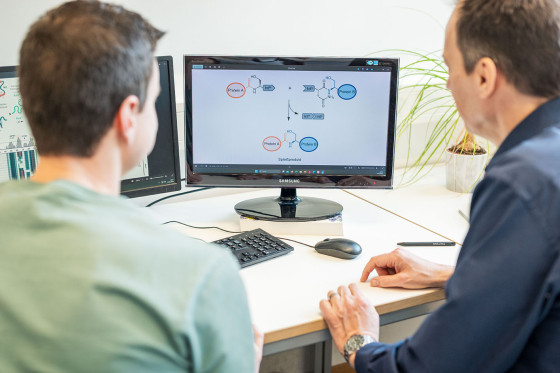
Research team improves method for producing designer proteins
Proteins are the building blocks of life. They consist of folded peptide chains, which in turn are made up of a series of amino acids. From stabilising cell structure to catalysing chemical reactions, proteins have many functions. Their diversity is further increased by modifications that take place after the peptide chains have been synthesised. One form of modification is protein splicing. The protein initially contains a so-called ‘intein’, which removes itself from the peptide chain to ensure the correct folding and function of the final protein. A team led by protein chemist Prof Henning Mootz and PhD student Christoph Humberg from the Institute of Biochemistry at the University of Münster has now answered a long-standing research question: Why does a special variant of the inteins, the ‘split inteins’, often encounter problems in the laboratory that significantly lower the efficiency of the reaction? The researchers were able to identify protein misfolding as one cause and have developed a method to prevent it.

The researchers in Münster investigated the so-called ‘Aes intein’, which enables a particularly broad range of applications thanks to a rare form of catalysis. Both fragments of the split intein were produced in the laboratory in bacterial cells and demonstrated only low productivity, similar to that of other inteins. Using chromatographic and biophysical methods, the team discovered that a large proportion of one of the fragments produced was present as an inactive protein aggregate with a specific misfolding. From these findings, the researchers drew conclusions about the cause of the misfolding and used bioinformatic analyses to identify a few amino acids that are responsible for it. Using molecular biological methods, they introduced selected single mutations in the intein fragment, which almost completely suppressed the formation of the aggregates and increased the productivity of the split intein accordingly.
This research project was funded in part by the German Research Foundation (DFG).
Original publication
Humberg C. et al (2025): A Cysteine-Less and Ultra-Fast Split Intein Rationally Engineered from Being Aggregation-Prone to Highly Efficient in Protein trans-Splicing. Nature Communications 16, 2723; 10.1038/s41467-025-57596-x
